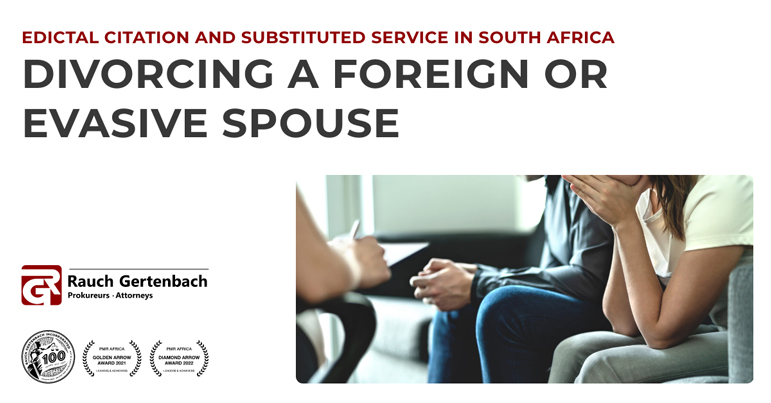DIVORCING A FOREIGN OR EVASIVE SPOUSE – EDICTAL CITATION AND SUBSTITUTED SERVICE IN SOUTH AFRICA
Divorce proceedings are initiated by the service of a summons on the Defendant. Generally, the service of a summons can be a rather simple process. However, difficulties arise when the whereabouts of the Defendant is or become unknown, or the Defendant resides and or works within a foreign jurisdiction.
South African law specifically provides that a divorce summons must be served personally on the Defendant as it constitutes a change in a person’s status (from married to unmarried). Only when the Plaintiff has exhausted all avenues in an attempt to locate the said Defendant to personally serve a divorce summons and the attempts have proven to be fruitless, alternative pathways should and may be considered.
The alternative options which litigants have are to either proceed with substituted service, alternatively edictal citation, or further in the alternative a combination of the aforesaid processes.
What is Substituted Service and Edictal Citation?
Substituted service
Substituted service is a process in which the Plaintiff seeks, by application, directions from the Court regarding the service of a summons upon a person known or believed to be within the borders of the Republic of South Africa, but cannot be traced and/or evades personal service.
The Rules regulating the proceedings in Magistrate’s and High Courts allow for the frustrated Plaintiff to approach the Court with an application on an Ex Parte basis (no notice of the application is given to the other party) for leave to be granted in order for an alternative method to be used for effecting service of the summons.
The Plaintiff will need to prove to the Court that he or she has exhausted all avenues trying to trace the Defendant and that personal service is not possible considering the relevant facts.
If the Court is satisfied that the Plaintiff has indeed exhausted all avenues trying to trace the Defendant and the whereabouts of the Defendant are still unknown, the Court may order that service of the Summons be effected by e-mail, publication in the newspaper, WhatsApp, Instagram, Facebook or any other means which the court deems appropriate.
Edictal Citation
In the event that the Defendant resides outside the borders of the Republic of South Africa, the Plaintiff will need to approach the Court for leave to sue by means of Edictal citation.
The Edictal Citation process involves making use of a correspondent, being the equivalent of the South African Sheriff in a foreign country in order to manage and execute the service of the summons on the Defendant. The citation and declaration (summons) need to be accompanied by a translated document in the language of the relevant county.
The application for leave to sue by Edictal Citation will follow the same suit as substituted service in that the application will be brought on an Ex Parte basis.
In the event that the Court grants the Plaintiff’s edictal application and service of the divorce, summons have been successfully served, the Defendant will then have 30 (Thirty) days to indicate, by way of a Notice of Intention to Defend, whether the divorce summons will be opposed.
Combination of substituted service and edictal citation
If the Defendant is beyond the border of the Republic of South Africa and his/her whereabouts are unknown, the Plaintiff can use a combination of substituted service and edictal citation.
The Plaintiff will need to prove to the Court that a thorough investigation has been conducted to ascertain the whereabouts of the Defendant. If the Court is satisfied that the Plaintiff has taken all reasonable steps to trace the Defendant outside the borders of the Republic and that the Plaintiff has been unsuccessful, the Court may order that one of the alternative means of service mentioned under substituted service be used to serve the Summons on the Defendant.
Conclusion
We live in a new era where people across the globe are connected by social media and/or other electronic means. The Courts have, although merely as an alternative to the old, steadfast Rules, made provision for alternative methods of service to be used thereby adapting, in some sense, to the ever-changing environment.
The aforesaid principles do not only find application in divorce proceedings, but general litigation as well. Whether you have been struggling to initiate divorce proceedings or find that evasive debtor, our office will be able to assist you.
Article by Ruben Maritz, Associate (LLB)
Kindly contact Ruben, ruben@rgprok.com, or 044 601 9900, should you require any further information. www.rgprok.co.za
Disclaimer
Nothing contained in this publication is to be considered as the rendering of legal advice for specific cases, and readers are responsible for obtaining such advice from their own legal counsel. This publication is intended for educational and informational purposes only.








